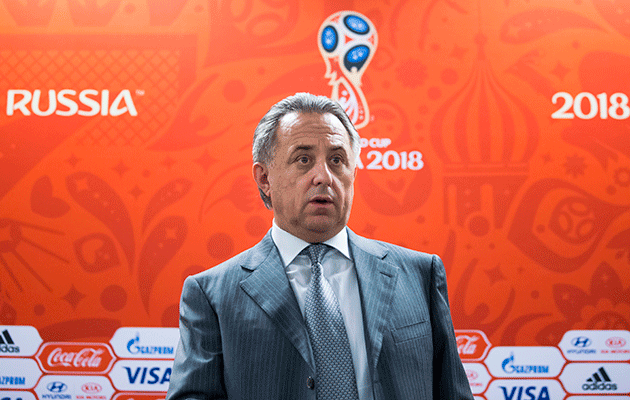Vitaly Mutko, for all the outrage prompted by the McLaren Report into Russian doping, is confident of sailing comfortably towards a further four-year term on the governing councils of international football
However he has been named by UEFA among the European federation’s candidates to serve on the FIFA Council which will be reconstituted at congress in Manama, Bahrain, in May.
Mutko has followed President Vladimir Putin all the way up the ladder of power from St Petersburg.
Two months ago he was promoted from Sports Minister to Deputy Prime Minister by Putin after ensuring that most of Russia’s team competed at the Rio Olympics in August in the teeth of a storm over accusations of a state-sponsored doping cover-up system.
Mutko is also president of the Russian Football Union and head of the local organising committee of the 2018 World Cup.
He has served around the governing body’s top table since being first voted on to the FIFA executive committee (as it then was) by European federation UEFA in 2009.
The 58-year-old’s influence attracted international attention after Russia won World Cup hosting rights in a controversial vote by the FIFA exco in 2010. A subsequent ethics inquiry made little progress in Russia, being brushed off with excuses about hired and wiped computers.
Mutko, through his Sports Minister status, came under heavy suspicion over what he knew about domestic doping when the scandal exploded last year. One WADA investigation by former president Dick Pound was followed by McLaren’s interim report last July.
Senior Russian sports officials, also meaning Mutko, were barred from attending the Rio Olympics by the International Olympic Committee.
In the meantime Mutko was busy playing an influential role behind the scenes within UEFA, on whose executive committee he serves, to support the ultimately successful presidential campaign of Slovenia’s Aleksander Ceferin.
Then, two weeks ago, came McLaren II and renewed calls from critics in the west for Mutko to be investigated by the FIFA ethics chamber and barred from extending his terms of office with both UEFA and FIFA.
UEFA stages its elections for five ordinary members on the FIFA Council at its Helsinki congress on April 5. Five candidates are standing for four seats with four-year terms with another two-year term having been opened up by the resignation of banned German Wolfgang Niersbach.
The candidacy deadline expired on December 5 and the five candidates (pending FIFA eligibility checks) have been confirmed as Sandor Csyáni (Hungary), Costakis Koutsokoumnis (Cyprus), Dejan Savicevic (Montenegro), Geir Thorsteinsson (Iceland) and . . . Mutko.
Critics point to McLaren as having provided damning evidence against Mutko. However, this is to read beyond what the Canadian wrote in his 38-page report.
McLaren’s first reference to “the Minister” concerns the approval of apparently clean sportsmen and women to compete at London 2012.
His executive summary does not talk of a “state-sponsored” plot but “an institutional conspiracy.” Obviously this has greater significance than mere semantics since it edges responsibility away from Russia’s governing politicians.
McLaren noted the sackings of Deputy Sports Minister Yuri Nagornykh and anti-doping adviser Natalia Zhelanova. But his one and only reference to Mutko by name concerns a vain attempt to arrange a meeting.
More than 30 sports, including football, were identified by McLaren as having been involved in concealing positive doping tests; associated emails referred to suspicious [oing sample from Russia’s men’s under-17 and under-21 national teams in 2013 and 2014; another case, involving an Uzbek player in the domestic league, was allegedly referred for clearance to Mutko.
However, at a news briefing in London, McLaren very specifically sidestepped an opportunity to single him out.
Asked directly about Mutko’s responsibility and whether Russia should be stripped of the World Cup, McLaren said: “I don’t have an opinion. That’s up to other people. They should look at the report and draw their own opinions.”
There is no possible prospect of Russia being stripped of the World Cup and McLaren refused to point a finger of blame. If Mutko’s critics want blood then they need to look elsewhere.







